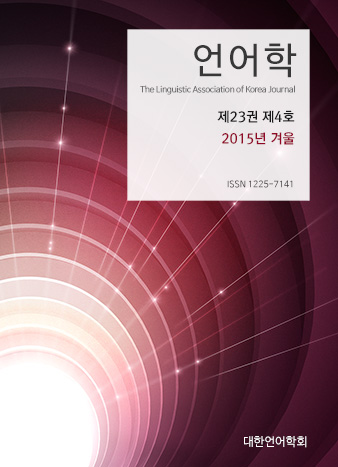대한언어학회 전자저널

23권 4호 (2015년 12월)
Abstract
Choe, Jinsun. (2015). Linking Problem in the L2 Acquisition of English Raising. The Linguistic Association of Korea Journal 23(4), 115-130. This study investigates whether Korean learners of English comprehend English constructions that involve raising over an experiencer (e.g., John seems to Mary to be happy). Such constructions exhibit a non-canonical mapping on the surface, which violates the Thematic Hierarchy, as the theme NP John maps to the higher syntactic position than the experiencer NP Mary. A Truth-Value Judgment Task was employed to test thirty Korean L2ers of English, whose English proficiency was measured via a C-test, and thirty-five native English speakers. The results revealed that L2ers have difficulty comprehending raising structures with an experiencer, and that more advanced learners exhibit higher levels of competence. As English raising over an experiencer is a cross-linguistically highly marked phenomenon, these findings suggest that L2ers have a tendency to follow a canonical mapping rule that links experiencers to the subject position, when they are faced with a structure that is illicit in their L1. Finally, these results are considered in relation to the previous findings on L2 acquisition of English psych verbs.
Keywords
# raising # experiencer # psych verbs # linking problem # second language acquisition
References
- Belletti, A., & Rizzi, L. (1988). Psych-verbs and θ-theory. Natural Language and Linguistic Theory, 6, 291-352.
- Boeckx, C. (1999). Conflicting c-command requirements. Studia Linguistica, 53, 227-250.
- Boeckx, C. (2008). Raising across experiencers cross-linguistically. In Aspects of the syntax of agreement (pp. 150-161). London: Routledge.
- Callies, M. (2008). Easy to understand but difficult to use? Raising constructions and information packaging in the advanced learner variety. In G. Gilquin, M. B. Diez-Bedmar, and S. Papp (Eds.), Linking contrastive and learner corpus research (Language and Computers, Vol. 66) (pp. 201-226). Amsterdam: Rodopi.
- Campos-Dintrans, G., Pires, A., & Rothman, J. (2012). Subject-to-subject raising and the syntax of tense in L2 Spanish: A Full Access approach. Bilingualism: Language and Cognition, 17(1), 38-55.
- Chen, D. (1997). L2 acquisition of psych predicates by native speakers of Chinese and French. Doctoral Dissertation. McGill University.
- Crain, S., & McKee, C. (1985). The acquisition of structural restrictions on anaphora. In Proceedings of NELS 16. 94-110.
- Crain, S., & Thornton, R. (1998). Investigations in universal grammar: A guide to experiments in the acquisition of syntax and semantics. Cambridge, MA: MIT Press.
- Dowty, D. R. (1991). Thematic proto-roles and argument selection. Language, 67, 547-619.
- Givón, T. (2001). Syntax, An introduction. Vol. 2. Amsterdam: John Benjamins Publishing Company.
- Grimshaw, J. (1990). Argument structure. Cambridge, MA: MIT Press.
- Hirakawa, M., & Suzuki, K. (2014). Is the dog 'frightened' or 'frightening'? Psych adjectives in L2 English by speakers of Japanese and Spanish. R. T. Miller et al. (Eds.), Selected Proceedings of the 2012 Second Language Research Forum (pp. 134-144). Somerville, MA: Cascadilla Proceedings Project.
- Jackendoff, R. (1972). Semantic interpretation in generative grammar. Cambridge, MA: MIT Press.
- Juffs, A. (1996a). Learnability and the lexicon: Theories and second language acquisition research. Amsterdam and Philadelphia, PA: John Benjamins.
- Juffs, A. (1996b). Semantics-syntax correspondences in second language acquisition. Second Language Research 12(2), 177-221.
- Landau, I. (2010). The locative syntax of experiencers. Cambridge, MA: The MIT Press.
- Pesetsky, D. (1995). Zero syntax: experiencers and cascades. Cambridge, MA: The MIT Press.
- Sato, Y. (2003). Japanese learners' linking problems with English psych verbs. Reading Working Papers in Linguistics, 7, 125-144.
- Schulz, B. (2006). Wh-scope marking in English interlanguage grammars: Transfer and processing effects on the second language acquisition of complex wh-questions. Doctoral Dissertation. University of Hawaii.
- Schwartz, B. D., & Sprouse, R. (1996). L2 cognitive states and the full transfer/full access model. Second Language Research, 12, 40-72.
- Schwartz, B. D., & Sprouse, R. (2000). When syntactic theories evolve: Consequences for L2 acquisition research. In J. Archibald (Ed.), Second language acquisition and linguistic theory (pp. 156-186). Malden, MA: Blackwell.
- Um, H-J. (2010). A-movement and pro in Korean. Studies in Modern Grammar, 59, 67-88.
- White, L., Brown, C., Bruhn-Garavito, J., Chen, D., Hirakawa, M., & Montrul, S. (1998). Psych verbs in second language acquisition. In E. Klein, and G. Martohardjono (Eds.), The development of second language grammars: A generative approach (pp. 171-196). Amsterdam and Philadelphia, PA: John Benjamins.